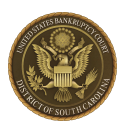The Judges and staff of the U.S. Bankruptcy Court wish everyone the happiest of holidays and a happy new year.
You are here
Chambers' Bulletins
12/2006
The Judges would like to alert the bar to several matters to assist in the administration of cases.
1. The United States Trustee has reported recently that several bankruptcy referrals have been prosecuted and resulted in indictments in this District:
On October 4, 2006, a debtor was indicted for allegedly using a false Social Security number to file bankruptcy.
On October 10, 2006, a debtor was indicted for allegedly keeping rent proceeds he collected from property of the estate while he was in bankruptcy. The rent proceeds were also property of the estate and should have been turned over to the bankruptcy trustee.
On October 10, 2006, an individual was indicted for forging a bankruptcy judge’s signature to a document in order to qualify for a loan on a used car.
On November 28, 2006, a debtor was indicted for concealing bank accounts and an insurance claim and for false statements he made at his meeting of creditors.
A bankruptcy judge recently referred to the U.S. Attorney testimony provided by a debtor in a hearing that he had failed to report income from his rental properties in his Tax Returns for the applicable years.
2. The Judges have agreed that whenever a motion for relief from the automatic stay represents that the movant agrees to waive certain claims or expenses provided under Sections 503(b) and 507 and to return to the estate any proceeds in excess of the liquidation of its secured claims, that such provisions should also be included in the proposed order/settlement order submitted to the Court if applicable to that order. The case trustees have agreed to monitor proposed orders for compliance with this requirement.
3. According to the recent ruling by the United States District Court in In re Singleton, C/A No: 02.06-CV-1666-PMD, a party seeking to have the Court reconsider dismissal in a case which has also been closed should file a motion to reconsider dismissal that meets the requirements of FRCP 60 and a motion to reopen. Merely requesting the reopening of the case may not provide the relief the movant seeks. Please consult the Court docket whenever taking such action to determine if the case has not only been dismissed, but also closed by the Court.
4. The official form required for filing in connection with a debtors completion of a financial education course before discharge has changed effective October 1, 2006. Debtors counsel should ensure the official form is executed by the debtor and completed (including the number of the educators certificate) and filed with a copy of the certificate. (Again this is a different requirement and form than the credit counseling certificate required at the beginning of a case.) The new official form can be found on the Court's Web Page under Forms.
On December 5 Judge Burris issued an opinion on the applicability of the South Carolina Home Security Act (the new homestead exemption) in bankruptcy cases. This decision will likely affect consumer debtors throughout the state. The opinion was issued as a joint opinion in four cases and all three judges concur in the result. The lead case number is 06-02413 and the order can be viewed therein via CMECF and will be available on the court's website soon.
On behalf of the Judges of this Court, Chief Judge Waites would like to announce two public service initiatives to be sponsored by the U.S. Bankruptcy Court and invite participation by the bar.
The South Carolina Supreme Court has appointed a Task Force on Access to Justice with the goal being to improve the delivery of Legal Services to the state’s indigent population. Since many in this population face issues relating to debtor/creditor relations and bankruptcy, Judge Waites has been asked to serve on the Task Force. In order to consider factors which may improve the availability of legal services in the bankruptcy area, the Judges will invite bankruptcy practitioners to participate in two meetings to discuss issues related to the availability of legal services. Topics include information provided by the Court to pro se parties, educational programs on the Reform Act and bankruptcy, the unbundling of legal services in certain situations, locations of court hearings and consideration of the structure of court divisions, courtroom assistance for pro se parties, and mediation procedures involving pro se parties, among others.
The Credit Abuse Resistance Education (CARE) Program is a national initiative in which many bankruptcy courts coordinate the availability of judges, trustees and experienced attorneys or staff to speak to high school and college students regarding the use of consumer credit and the consequences of credit abuse. There is no required format or agenda for such presentations which are coordinated by the Court, but a training program and materials will be made available. Judge Waites has previously received requests from schools in various parts of the state, so assistance from the bar statewide would be appreciated. The CARE program is already available in many other districts and has been proven to be a well received and beneficial public service.
Trustees, Counsel or experienced bankruptcy staff willing to participate on these initiatives should advise Judge Waites on or before December 12, 2006 at waites_chambers@scb.uscourts.gov.
